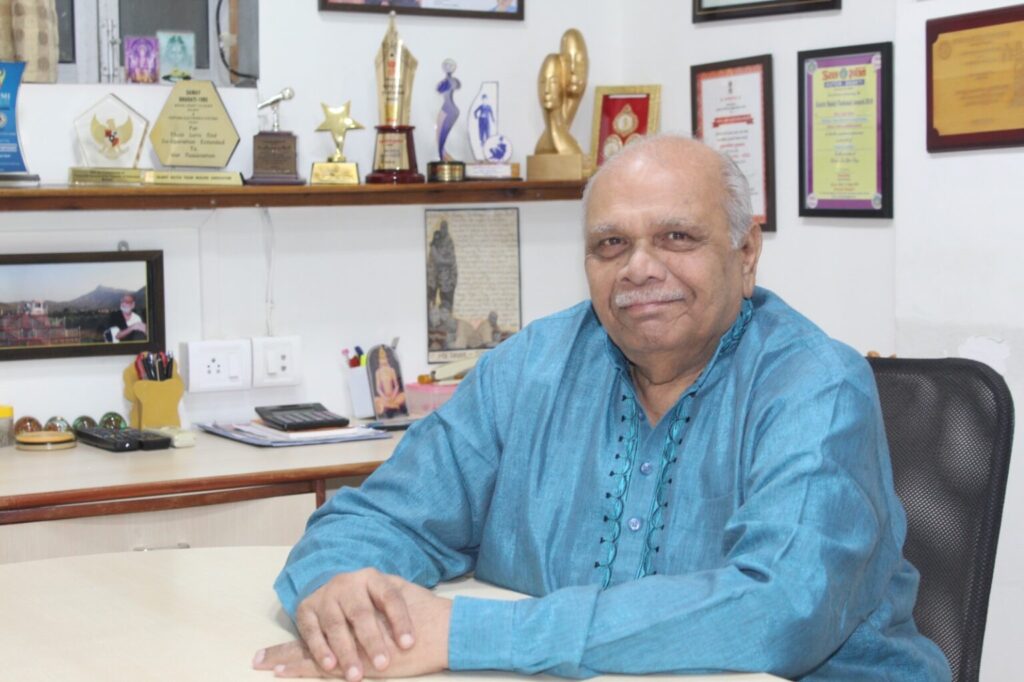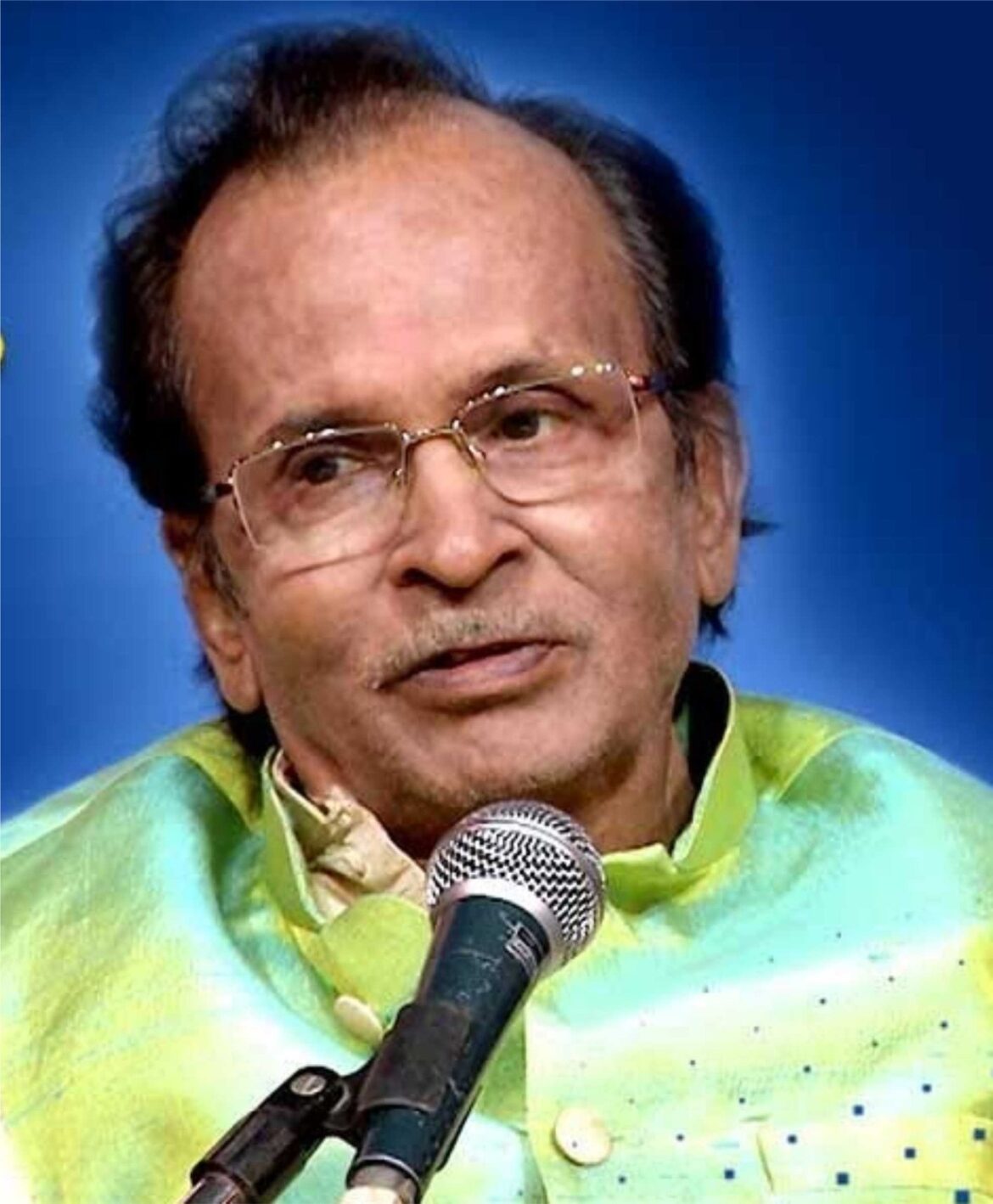Purushottam Upadhyay, a founding member of the revival of Gujarati Sugam Sangeet, went on his final journey at the age of 90, bidding his final goodbye on December 14, 2024 in Mumbai. With him, Gujarati language has lost a loving life saver.
His friends, admirers and followers bade their goodbye on December 15, 2024 at Bharatiya Vidya Bhavan (Bhavan hereafter) to which he was attached from the beginning of his career.
For the love and respect of Upadhyay, bouquets of songs composed by him were offered in his memory by singers including Parthiv Gohil, Manasi Parekh, Falguni Pathak, Nisha Upadhyay, Uday Mazmudar, and others who had been mentored by him, said friend and partner Niranjan Mehta to News India Times.
Bhavan Connection:
Bhavan was one place at which Upadhyay began and rose to great heights, according to Mehta.
Upadhyay was one of the founding members of Bhavan’s Cultural Center Andheri, established in 2003, founded on then Andheri Bhavan’s Chairman Dr. M.L. Shrikant’s idea of creating a multi-lingual and multi-dimensional culture center on the campus.
Lalit Shah of Copwud joined in along with Niranjan Mehta and the music maestro Purushottam Upadhyay. Lalit Verma, and Shri Anil Kavish, completed the founding team who were all volunteers.
Since inception, the Andheri Cultural Center holds art and culture festivals, organizing 200 programs a year in collaboration with Bhavan’s Chowpatty Kala Kendra, becoming one of the most culturally enhanced centers.
Among its programs are the Swarkar Sammelans; conversations with literary dignitaries including writers, poets and playwrights; classical dance performances; dance ballets; musical tributes and hard classical music performances, all in different languages.
Upadhyay’s Bhavan connection goes beyond that. As assistant to his mentor musician Avinash Vyas, Upadhyay used to be at Bhavan’s Kala Kendra Chowpatty. Mehta met Upadhyay at Bhavan in 1960 and they developed a friendship which lasted till now, Mehta said.
Bhavan’s Kala Kendra at Chowpatty had at the time become an ‘Adda’ of upcoming drama personalities, including Adi Marzban, and music personality Avinash Vyas and many more. Upadhyay was part of the young stage and music personalities discussing all things related to drama and music sitting on the steps of Bhavan, Mehta remembered.
Upadhyay’s relationship with Bhavan grew stronger when he revived Bhavan Kala Kendra’s dormant ‘aa maas na geeto’ program bringing it to great success, Mehta said.
With the establishment of Swarkar Sammelan in 1987, first at Chowpatty Bhavan, and then at Andheri Center, Upadhyay became permanently attached to Bhavan.
What is Swarkar Sammelan :
Swarkar Sammelan was an idea very close to Upadhyay’s heart. “We are happy we implemented it,” Lalit Shah, Director of Bhavan’s Cultural Center Andheri, told News India Times. Upadhyay also crated its design along with Mehta.
Since 1987, 6 Swarkar Sammelans have been held and Upadhyay was part of all of them, Shah said. “They were all organized under his guidance,” Shah said.
The idea of the festival was to promote new and upcoming musical talent. “Singers get acclaimed but no one remembers the composers. So we thought about a convention for them. It has been our philosophy and our aim to provide an opportunity and a platform to the new composers and singers in Gujarati”, Upadhyay had said at the opening of online Swarkar Sammelan during Covid.
Contribution to Music:
Upadhyay’s immense contribution to music is evident in his encouraging, mentoring and creating new composers, new poets and new singers in Gujarati language.
“Almost 90 percent of Gujarati Sugam Sangeet artists have trained under Upadhyay in the beginning of their careers,” Mehta said.
Upadhyay prepared the new generation of Gujarati musicians, Shah said.
He not only recognized another person’s talent, but also spent time on honing it to its best presentable form.
Knowers of music admired Upadhyay’s compositions more than his singing. He always experimented with the musical form as can be seen from his composition of poet Umashankar Joshi’s poem ‘ame suta zarna ne jagadyu’ which he composed in the style of a choral harmony.
“His genius lay in his vibrant expression of the poems,” Mehta said.
“No one could present the words, the sentiments, the spirit, the rhythm, and the emotions the way Upadhyay did,” he added.
In ‘Paan Leelu Joyu Ne Tame Yaad Aawya’, Upadhyay imparted a subtlety, tenderness, intensity, intimacy, all with help of his voice, illustrating the closeness of the relationship, Mehta pointed out.
Upadhyay also had the distinct ability to recreate variations in his own singing, coaxing the audience, according to Shah. Beginning to sing at a very young age, Upadhyay could sing till the age of 89. “He could still hold swar,” Shah said. Beginning to sing at a very young age, Upadhyay could sing till the age of 89. “He could still hold swar,” Shah said.
Music was in his blood. During the end, Upadhyay did not recognize even his friends who went to see him. “But if you hummed a few lines of his song, he would still complete the song,” Shah said.

Contribution to Gujarati Language and Literature:
Being a classically trained artist, Upadhyay could have achieved great fame by singing and composing in other languages including Hindi and Urdu. But he was determined to sing and compose only in Gujarati.
In one of his interviews upon receiving the Padma Shree, Upadhyay had said he had chosen to uphold respect of Gujarati language in the music world where even great singers were ignorant of the wealth of Gujarati language and literature.
After poet Narmad, Upadhyay may be the only person to take up the case of Gujarati language.
His becomes one of the biggest contributions to Gujarati Poetry, bringing Gujarati poems, written in ‘shuddh’ Gujarati language and expressing tender human emotions to the masses, some of whom did not even know what a poem was.
Upadhyay’s Impact:
Gujarati Sugam Sangeet worked in Upadhyay’s name, said Mehta.
“After Avinash Vyas, it has been only Upadhyay concerts which have been sold out,” said Shah, who called Upadhyay’s time the golden age of Gujarati music. “He gave us many rich songs,” he said.
His impact was seen not just among the amateur artists whom he trained and mentored. He was as much respected by the professional artists.
Mehta remembered Upadhyay’s impact during ‘Tathastu’ programs with professional composers.
“Whenever and whoever we approached, said yes, asked no questions and never asked for money,” Mehta said.
Mehta recalled that singer Falguni Pathak who had not even trained under Upadhyay, had refused to accept payment after participating in a concert, as a mark of respect for Upadhyay.
So had artists Sadhana Sargam and Sonali Rathod, as a token of their respect for Upadhyay.
Personality:
Upadhyay was not given to false modesty or fake humility. He was always self-confident, according to Mehta. “He always believed he was going to be the best. He had no doubt about that till the end,” Mehta said.
A sense of humor was part of his personality. Upadhyay used to intersperse his concerts with jokes and his friends used to tell him to do comedy shows.
Shah said Upadhyay was also known to break into parodies of his own songs at times, especially in friendly get-togethers.
Friendships :
Upadhyay had many friends. But he was particularly close to Mehta and Shah having known them his entire adult life.
His friendship was important to him and he gave it the utmost attention.
Mehta had been into organizing concerts and mushayras since 1965 and started Swar Gurjari in 1980, collaborating on 50 programs in 8 years with Upadhyay.
The Mehta-Upadhyay partnership went on for 20 years and they did 4 or 5 big concerts.
Mehta remembered how Upadhyay had not taken his payment for one of the Tathastu concerts that had failed badly, leaving him in a financial mess.
All those years of close professional relationship led to close family relationship, Mehta said, adding that did not stop him from criticizing Upadhyay. “He used to say that he had two worst critics in his life – his wife and me,” Mehta said.
“Upadhyay was my close friend. I was a witness to his life’s journey,” Shah said. Having first met in 1960, the two remained close over the years.
“I am happy that he and I were friends and could work together,” Shah said.
Upadhyay’s pet project, Swarkar Sammelan, has become a great success among music lovers of all ages in India and abroad. Its success had proved the worry about the demise of the language and literature false, according to Mehta.
According to Shah, Swarkar Sammelan has now become a talent spotting for good compositions.
“We see a very healthy and bright future ahead for this festival,” Shah had said earlier.
Upadhyay’s dream will continue to live and serve Gujarati language.
(Used with permission)






